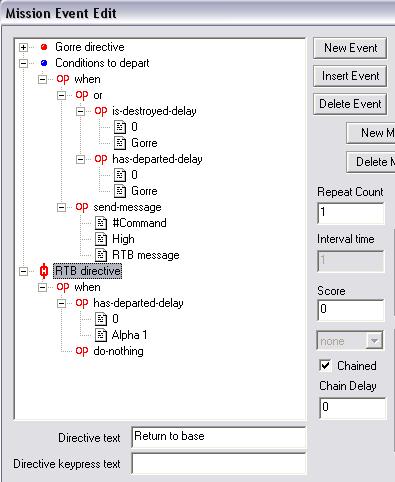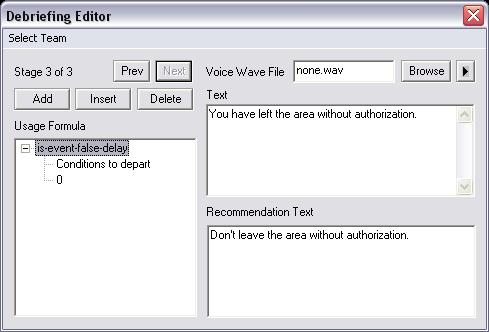AWOL debriefing stage
The AWOL debriefing stage refers to the debriefing stage that appears if the player jumps out without given authorization by a superior, traditionally Allied Command.
AWOL is an acronym for "absent without leave."
Generally speaking
There is no "best way" of doing the AWOL debrief. It depends on the mission's complexity and the mission designer's skills (more so on the former). This tutorial will demonstrate the method its author follows. It will not claim this methodology to be the "best," "most reliable," or "simplest." It will merely give the reader a rudimentary understanding of the subject.
The AWOL debriefing stage is technically identical to any other debriefing stage, but it is a more complicated one to do. Usually, beginner mission designers use simple Events and debriefing stages like ones that check if a specified ship is destroyed or has arrived. The AWOL debrief is inherently more complicated than that, because its purpose is to verify if the player jumped out after receiving authorization. To do that, the FREDder must set up a seemingly complex SEXP tree with multiple operators.
Through an example
Creating an AWOL debriefing stage can be explained through the same example mission that was used in the Return to base directive article. This tutorial presupposes a basic understanding of debriefing stages. If this is the first debriefing stage that you are planning to make, this may be too complicated.
In this mission, the player's wing was launched to destroy an Aeolus cruiser, named Gorre. The Aeolus jumps out after 45 seconds. This means that there are two possibilities to end the mission legally: The first is to destroy the cruiser, the other entails the Aeolus escaping. If the player jumps out before either outcome happens, he will be considered a deserter, and will receive the AWOL debriefing.
Before discussing the debriefing stage itself, we must go to the Events Editor and create an Event that deals with the "legal" outcomes.
The "Conditions to depart" Event collects all the conditions that are necessary to permit the player to jump out. In this example, the Gorre must either be destroyed or escape. If the player jumps out before either comes true, the "Conditions to depart" Event will turn false. It will turn false because in the instant the player jumped out, the Aeolus (Gorre) was still intact (not destroyed), and did not depart. Note that this Event will only check if the player jumps out after receiving authorization; the outcome of the mission is secondary when discussing the AWOL debrief.
The "Conditions to depart" Event in its current state has nothing to do with the debriefing yet. The mission must be told to put this Event to use in the Debriefing Editor.
Our Debriefing Editor looks like this. If the "Conditions to depart" Event turns false, our AWOL debriefing stage will appear.
Miscellaneous notes
- As already stated, this is not the best or easiest way to do a debriefing stage.
- Using the is-event-incomplete (or is-goal-incomplete) SEXP here is not recommended, because there is no such a thing as an incomplete goal (or Event) in a debriefing. If a given goal or Event is incomplete in the instant the player jumped out, it will automatically turn false.
- Making more than one AWOL debrief is not recommended for beginners. A simple oversight sometimes cause both AWOL debrief stages to be issued.
- To test if the "Conditions to depart" does not turn true or false prematurely, it is recommended that you apply a Directive text to your "Conditions to depart" Event. You will be able to monitor the status of your Event in-mission.
External links
- Sample mission (optimized for FreeSpace Open 3.6.9, Easy difficulty. Can also be used to learn the Return to base directive.)

